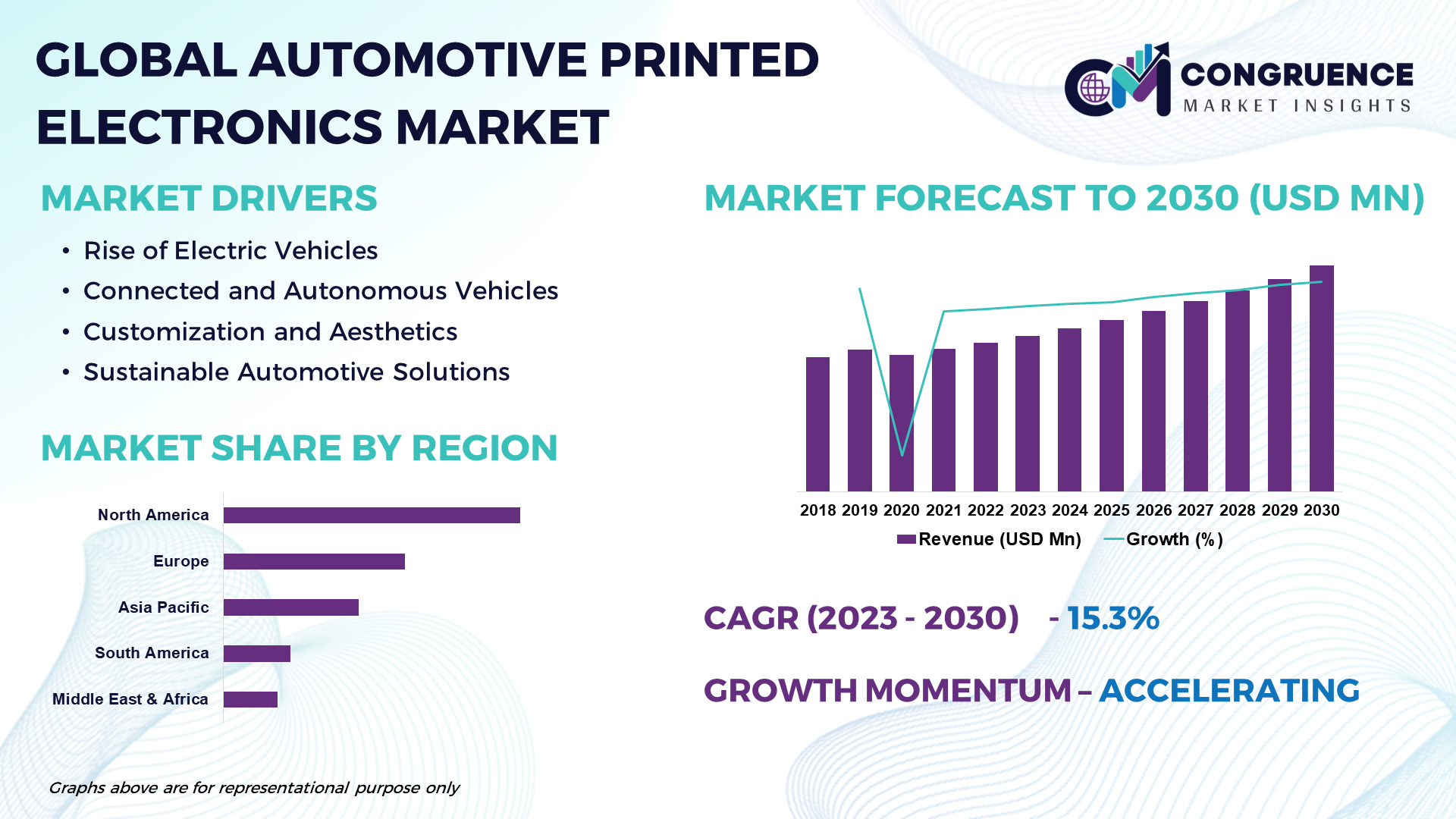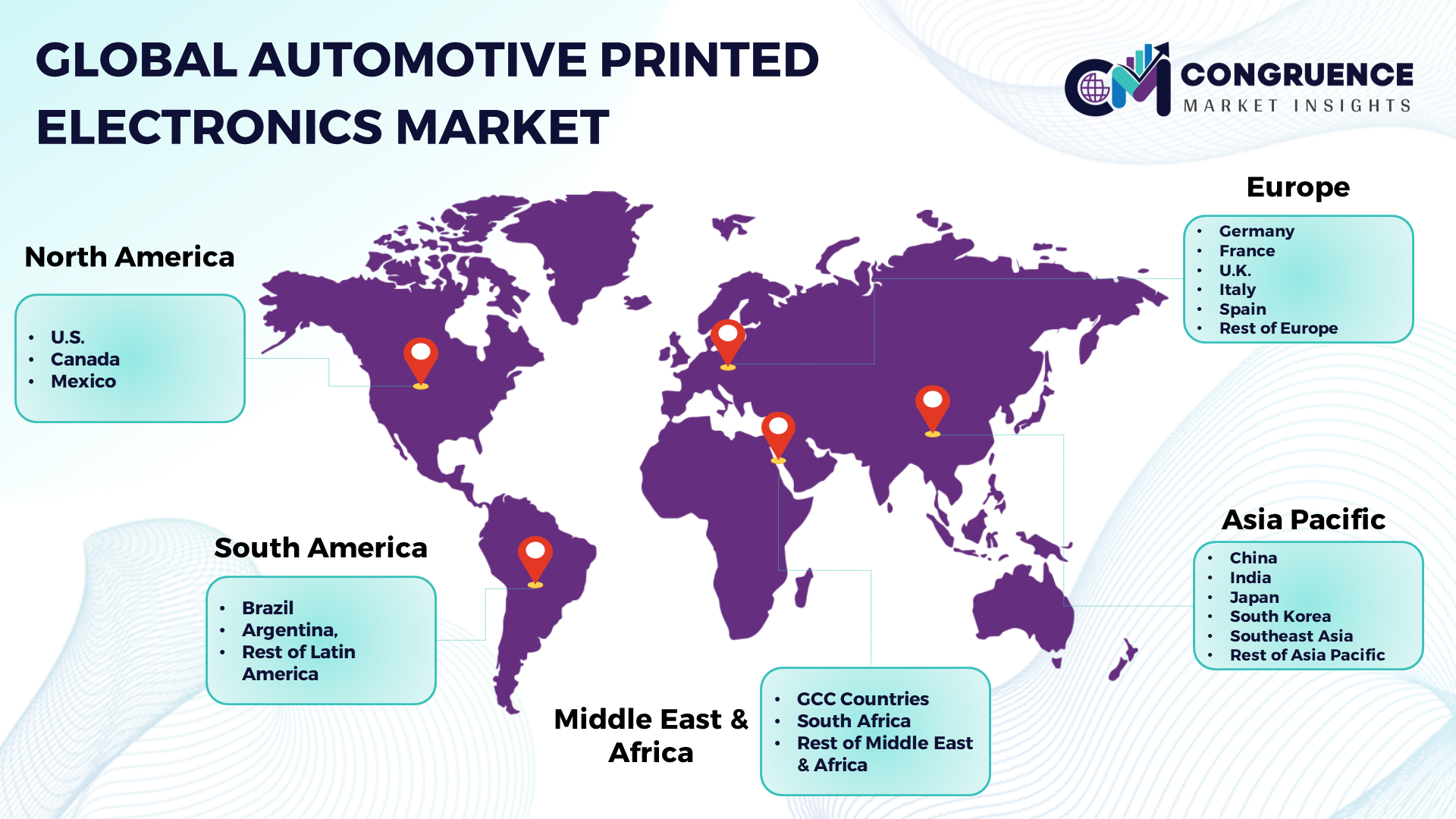Reports
The Automotive Printed Electronics market is at the forefront of innovation, ushering in a new era of intelligent and energy-efficient automotive solutions. This market involves the use of printed electronic components such as sensors, OLED displays, batteries, and lighting, transforming conventional automotive systems. From enhancing vehicle aesthetics to improving energy efficiency, printed electronics are reshaping the automotive landscape. Key components in the Automotive Printed Electronics market include advanced sensors for vehicle diagnostics, OLED displays for smart infotainment systems, and flexible printed batteries for electric vehicles. With a remarkable CAGR of 15.3% anticipated from 2023 to 2030, the Global Automotive Printed Electronics Market foresees substantial growth, driven by the increasing demand for connected and electric vehicles, as well as the pursuit of sustainable and lightweight automotive solutions.

Automotive Printed Electronics Market Major Driving Forces
Rise of Electric Vehicles: The surge in electric vehicle adoption propels the demand for lightweight and energy-efficient printed electronic components, including batteries and displays.
Connected and Autonomous Vehicles: The evolution toward connected and autonomous vehicles drives the need for advanced sensors, printed displays, and other electronic components to enable enhanced safety and communication features.
Customization and Aesthetics: Automotive manufacturers leverage printed electronics for customizable lighting solutions, OLED displays, and other components to enhance vehicle aesthetics and create unique driving experiences.
Sustainable Automotive Solutions: The emphasis on sustainability and environmental consciousness fuels the adoption of printed electronics, offering eco-friendly and energy-efficient alternatives to traditional automotive components.
Automotive Printed Electronics Market Key Opportunities
Integration of Smart Surfaces: Opportunities abound in the integration of smart surfaces with printed electronics, enabling interactive and touch-sensitive features on vehicle interiors and exteriors.
Advancements in Flexible Displays: The continuous development of flexible OLED displays creates opportunities for curved and customizable screens, enhancing in-car infotainment and driver-assistance systems.
Innovations in Sensor Technology: Opportunities lie in the ongoing innovations in printed sensor technology, enabling the development of advanced driver-assistance systems (ADAS) and other safety features.
Automotive Printed Electronics Market Key Trends
· 3D Printing of Automotive Components: The trend towards 3D printing of automotive parts, including printed electronics, offers design flexibility, rapid prototyping, and efficient production processes.
· Printed Lighting Solutions: The adoption of printed electronics for customizable and energy-efficient lighting solutions, including ambient lighting and dynamic indicators, is gaining traction in the automotive industry.
· Inkjet Printing Dominance: Inkjet printing emerges as a dominant technology for automotive printed electronics, offering precision, scalability, and the ability to print on various surfaces and materials.
· Printed Batteries for Electric Vehicles: Advancements in printed battery technology contribute to the development of lightweight and flexible energy storage solutions, particularly suitable for electric vehicles.

Market Competition Landscape
The global Automotive Printed Electronics market witnesses robust competition, with key players focusing on innovation and strategic partnerships to gain a competitive edge. Companies actively engage in developing advanced printed electronic components and exploring applications in next-generation vehicles. Notable players in the market include:
· Thin Film Electronics ASA
· Nanosolar Inc.
· NovaCentrix
· Enfucell Oy
· T-ink Inc.
· E Ink Holdings Inc.
· Ynvisible Interactive Inc.
· TactoTek Corporation
· Printed Electronics Limited
· Cymbet Corporation
These companies play a vital role in shaping the automotive industry by driving advancements in printed electronics and contributing to the development of smarter and more sustainable vehicles.
|
Report Attribute/Metric |
Details |
|
Base Year |
2022 |
|
Forecast Period |
2023 – 2030 |
|
Historical Data |
2018 to 2022 |
|
Forecast Unit |
Value (US$ Mn) |
|
Key Report Deliverable |
Revenue Forecast, Growth Trends, Market Dynamics, Segmental Overview, Regional and Country-wise Analysis, Competition Landscape |
|
Segments Covered |
· By Component (Sensors, OLED Displays, Batteries, Lighting, Others) · By Vehicle Type (Passenger Cars, Commercial Vehicles, Electric Vehicles) · By Printing Technology (Inkjet Printing, Screen Printing, Flexography, Gravure Printing) |
|
Geographies Covered |
North America: U.S., Canada and Mexico Europe: Germany, France, U.K., Italy, Spain, and Rest of Europe Asia Pacific: China, India, Japan, South Korea, Southeast Asia, and Rest of Asia Pacific South America: Brazil, Argentina, and Rest of Latin America Middle East & Africa: GCC Countries, South Africa, and Rest of Middle East & Africa |
|
Key Players Analyzed |
Thin Film Electronics ASA, Nanosolar Inc., NovaCentrix, Enfucell Oy, T-ink Inc., E Ink Holdings Inc., Ynvisible Interactive Inc., TactoTek Corporation, Printed Electronics Limited, and Cymbet Corporation. |
|
Customization & Pricing |
Available on Request (10% Customization is Free) |
